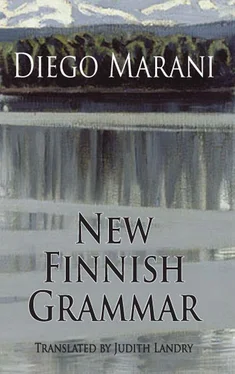As suddenly as he had begun to talk, Koskela now fell silent and settled back into his seat. Abruptly, the silence of all the woods of the north now fell upon the church. The stove was sending out a red glow, sculpting his face out of the darkness. Beyond the glass of the skylights, darkness was pressing down, creaking like the ice against the walls of the houses. Once more the same miracle had occurred: there on the bench in front of me, the bottle of koskenkorva was yet again half full.
Almost three months had passed since my arrival in Helsinki, and I had stopped asking about Doctor Lahtinen. The chaplain himself had made it clear to me that such inquiries were pointless. Perhaps he had been transferred, perhaps he really was in Karelia, perhaps he was dead. Perhaps he did not exist, as I continued to think, though without saying so. At all events no one had the time to look for him. With the bombing that was going on, the hospital staff had other fish to fry. The Russian planes would arrive by night; we could hear their distant rumble, the sound of the exploding bombs which they often also dropped over Vuosaari by mistake. Each raid would last for hours. People would leave the city or seek safety in shelters. No sooner had the sirens ceased their howl, than the first ambulances would arrive in the courtyard, and with them the first news of what had been hit, and the number of people who had died. ‘Satama, satama!’ The port, that was the word I heard repeatedly. The Russian air force was targeting the heart of the city, where people lived, and it was human flesh which flew into the air.
More snow had fallen during those same days. It had settled nonchalantly over that landscape of death, giving the Finnish people the hope that the bad weather might prevent the Russians from attacking. But a few nights later a low moon rose up from the bay, lighting up the city as mercilessly as a beacon. Where the Russian bombs fell, the white mantle of snow would be rent apart, leaving long ribbons of mud and stones. Now I could no longer sleep at night. Stretched out on my bed, I would wait for the sound of the sirens; then I would join the pastor and we would go and find the people who were proceeding in an orderly fashion towards the shelters. Sometimes, in the weak light of the bulb hanging from the low ceiling, Koskela would carry on with his Finnish lessons even there: amidst the pervading fear, they would take on a positively apocalyptic tone. I became aware that he was not addressing himself to me alone, but to all and sundry, because the people huddled all around us could hear him too. Sometimes, trying to distract themselves from the sound of the explosions which shook the ground beneath us, they too would begin to listen in fascination to the weird ramblings of that half-Swedish priest who had his own very personal ideas about language and history.
I found his words both complicated and intriguing; each day they bound me ever more closely to my new (or old?) identity.
‘When you are learning a new language, the first thing you learn is the noun; the word noun is associated with the word name, and naming a thing means knowing it. This is why we cannot pronounce the name of God, because it would be presumptuous to hope to know Him. The noun suggests an idea of something, it helps us know it. In Finnish to know is tietää , and tie means road, or way. Because for us Finns knowledge is a road, a path leading us out of the woods, into the sunlight, and the person who knew the way in the olden times was the magician, the shaman who drugged himself with magic mushrooms and could see beyond the woods, beyond the real world. It is of course true there is more than one possible path to knowledge, indeed there are many. In the Finnish language the noun is hard to lay hands on, hidden as it is behind the endless declensions of its fifteen cases and only rarely caught unawares in the nominative. The Finn does not like the idea of a subject carrying out an action; no one in this world carries out anything; rather, everything comes about of its own accord, because it must, and we are just one of the many things which might have come about. In the Finnish sentence the words are grouped around the verb like moons around a planet, and whichever one is nearest to the verb becomes the subject. In European languages the sentence is a straight line; in Finnish it is a circle, within which something happens. In our language every sentence is sufficient unto itself, in others it needs surrounding discourse in order to exist, otherwise it is meaningless.’
Oddly enough, when he gave me lessons during our enforced stays in the air-raid shelters, the pastor would not hesitate to launch into some almost dangerously liberal analysis of languages and people, without worrying in the least about divulging his personal ideas concerning good and evil. His sermons, on the other hand, were always very decorous and unimpeachable in terms of dogma; when he was preaching he did not make so bold as to divert the course of migrations, nor did he follow shamans into forests. When he was at the altar, Koskela was a different man: he closed ranks with his church and his sermons took the form of simple moral precepts, hand-me-down phrases which he uttered with a hint of tedium, as though he were acting a badly-learned part in a play he didn’t much like. All that remained of his exuberant personality were the sweeping, tragic gestures, his way of sending his hands flying upwards, fingers outstretched. When he talked of God, he reverted to the familiar tone he used when discussing Ural-Altaics; but only someone who knew him as well as I did could have noticed. He always seemed to be in a hurry to bring matters to a close, not because he had some other duty to perform, but because for him everything had to be concluded as quickly as possible; as though life were a warehouse to be cleared, a lorry to be unloaded — a corvée like any other in the perpetual motion of the universe. Despite the fact that war and devastation were tightening their grip upon the city, the hours that I spent with Koskela were always utterly serene. We did not know it, but cutting ourselves off from the world during that endless winter was the saving of us. Trapped beneath the ice, harm was powerless against us.
‘As long as it’s snowing, they can’t fight!’ the pastor would say resignedly, looking out of the sacristy window. We were both looking forward to the thaw, although for different reasons: he because he may already have known of the death which he was going to meet and which, like everything else, he simply wanted to be over and done with; I because I cherished the fond hope that the part which had died within me might reawaken with the spring. As soon as I was out of his company I was again assailed by all the desolation which had dogged me since my reawakening on the Tübingen. I was beginning to be able to express myself, even if somewhat stiltedly. I would learn the words already declined, a different one for each case, and when I did not know how to put them together I made do with saying them at random, hoping that intonation and gesture would go some way towards making up for lack of syntax. And yet, while still lacking firm banks, the Finnish language was gradually carving itself out a bed in the quicksands of my mind, with the words that I had tamed coursing down it and gradually informing me of the meaning of others. Branching out and joining up, they sent the thousand drops of sound which make up a language into circulation, watering and strengthening my awareness, my ability to sense the boundaries of meaning. But I was still haunted by my ignorance of my own past. Wandering around Helsinki, I would sometimes be jolted by a fleeting sense of memory: the view from a corner of the street would suddenly seem familiar, and then I would set to scouring every foot of road, peering at the names on bells on the doors of the buildings to see whether there might not be some Karjalainen among them. I would dream that I was outside my old house, that someone up there was waiting for me, gazing nostalgically at an old photograph which had been slipped into the glass of the dresser. We had mingled but not totally bonded, Finland and I; something in me remained untouched by this mingling, as though deep down some buried identity was refusing to be wiped out and was struggling furiously to rise to the surface.
Читать дальше












